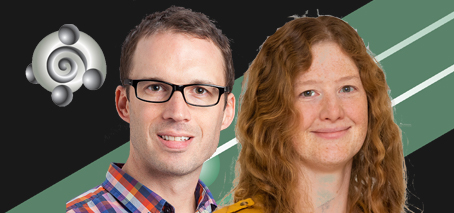Ahead of this weekend’s Climate Action Summit in New York, FLEET (Australia) and the MacDiarmid Institute (New Zealand) today announced a new partnership between the two science organisations, which share a mission to search for future low-energy electronics via the development of novel materials and devices.
MacDiarmid is the premier centre for materials research in NZ, and co-Directors Professor Justin Hodgkiss and Associate Professor Nicola Gaston become new FLEET Partner Investigators.
“This agreement is a formalisation of what has already been a very fruitful relationship, and shared goals, between the Institute and FLEET,” said FLEET Director Professor Michael Fuhrer.
Both organisations focus on fundamental materials science research to create a paradigm change in computational capability. An example is the work being done to address the energy and heat lost through current electronics.
MacDiarmid Institute Co-Directors Associate Professor Nicola Gaston and Professor Justin Hodgkiss said this research area was crucial to climate change mitigation, and a low carbon future. They also noted that the research area particularly depended on theoretical development.
“Through collaboration, we can share theoretical development but also equipment for experimentation, which is highly specialised,” said Associate Professor Nicola Gaston.
Professor Justin Hodgkiss detailed future collaborations: “Together we’ll focus on low energy computing and new types of electronics, working on materials for the electronics that make low energy computing possible to solve the data centre problem. Nanostructures are useful for this, conceptually, because the nanostructure is small enough to control electron movement, and that control is what means energy is not wasted.
The challenge facing the new partnership is to reduce the energy used in information and communication technology (ICT), which now accounts for 8% of the electricity use on Earth, and is doubling every 10 years.
The current, silicon-based (CMOS) technology is 40 years old, and reaching the limits of its efficiency. To allow computing to continue to grow, we need a new generation of ultra-low energy electronics.
As well as developing new materials and devices for future low-energy electronics, MacDiarmid and FLEET share broader commitments including science-outreach, education and improvements to the equity and diversity landscape within science.
Associate Professor Nicola Gaston (University of Auckland) will bring significant expertise in condensed-matter physics while Justin (Victoria University of Wellington) brings expertise and facilities for ultrafast optical spectroscopy.
Assoc Prof Nicola Gaston (University of Auckland) studies variations in physical properties of materials as a function of size, from few-atom clusters to large nanoparticles and the bulk. Her research seeks an understanding of the relationship between electronic structure, physical properties effects of the underlying material structure. Nicola is a prominent science communicator and advocate for women in academia, a past President of the New Zealand Association of Scientists, and author of Why Science Is Sexist.
Prof Justin Hodgkiss (Victoria University of Wellington) uses ultrafast optical spectroscopy in search of molecular electronic materials for new, low-cost printable electronics – primarily solar cells. His group invented transient grating ultrafast fluorescence spectroscopy, and has used laser spectroscopy to develop a detailed understanding of the physics of photocurrent generation in printable solar cells. Prof Hodgkiss’s group also studies bio-templated assembly of organic semiconductors, recently developing a class of hybrid materials using natural peptides to encode the assembly of organic semiconductors into functional electronic devices.
Prof Michael Fuhrer (Monash University) is a pioneer of the study of 2D and atomically-thin materials, including carbon nanotubes, graphene, atomically-thin semiconductors, and the surface states of topological insulators. Within FLEET’s topological materials research theme, Prof Fuhrer’s group synthesises and studies new, ultra-thin topological Dirac semimetals and two-dimensional topological insulators with large bandgaps.
Previous collaborations between the two organisations have included the NZ sustainable material-science event, Materialise, and a number of MacDiarmid investigators joined FLEET at the Centre’s 2018 annual workshop as well as at the FLEET-hosted 2019 materials conferences ICON2DMat in Melbourne. Fleet investigators also joined the MacDiarmid Institute Tomorrow’s Electronic Devices theme meeting in Wellington in February 2018.
MacDiarmid Institute Principal Investigator Simon Granville has ongoing collaborations with four different FLEET institutions, including Monash University in Melbourne. Along with his collaborator at Monash, Assoc-Prof Nikhil Medhekar, he’s looking at the physics of magnetic thin films with new and unusual electronic properties, with applications in highly energy efficient computing.
MacDiarmid (the MacDiarmid Institute for Advanced Materials & Nanotechnology) is a NZ Centre of Research Excellence comprising 33 principal Investigators, 43 Associate Investigators and a large number of postgraduate students and post-doctoral fellows across seven NZ universities and research institutions, and three formal MOUs with international organisations.
FLEET (the ARC Centre of Excellence in Future Low-Energy Electronics Technologies) is an Australian Research council funded centre combining over 100 researchers across seven Australian universities and 18 international partner organisations.
For more information:
- MacDiarmid Institute | Young@vuw.ac.nz | +64 (0)22 605 5007 or +64 (0)27 426 3453
- FLEET | media@FLEET.org.au | +61 (0)423 139210



